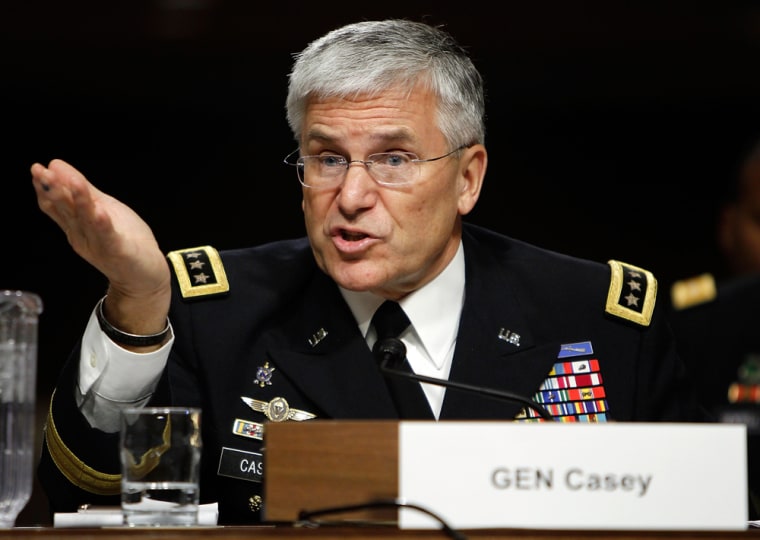The Army's top uniformed officer said Tuesday that he has "serious concerns" about overturning a 17-year policy that bans gays from serving openly in the military and supports a yearlong study into the matter before any changes are made.
The carefully crafted comments by Army Chief of Staff Gen. George Casey to the Senate Armed Services Committee indicate reluctance by some within the military's senior ranks to President Barack Obama's plan to repeal "don't ask, don't tell."
Obama says the policy is wrongheaded and should change. Defense Secretary Robert Gates agrees but wants to move slowly, and has tasked a lengthy assessment on how to lift the ban without affecting the force.
Casey's testimony as a service chief is considered crucial to the debate. As the top uniformed officials in each service, a service chief is in charge of recruitment and preparing troops for deployments. If the policy on gays is overturned, the chiefs would have to decide how to implement the changes.
"I do have serious concerns about the impact of a repeal of the law on a force that is fully engaged in two wars and has been at war for eight-and-a-half years," Casey told the Senate panel. "We just don't know the impacts on readiness and military effectiveness."
Aubrey Sarvis, executive director of the Servicemembers Legal Defense Network, which advocates to repeal the law, said it's important to note that Casey doesn't oppose Gates' study on how a repeal would be implemented.
"There will continue to be differences around the margins, but at the end of the day, I think the chiefs will salute" the president and other leadership, said Sarvis.
Legal limbo
Casey and other service leaders have said they would abide by any changes of law or new orders by the president. But their personal opinions could still sway Congress. Some Democrats are hesitant to change the law and might join Republicans in trying to block legislation if they are convinced that an overturn could hurt the military's ability to fight.
Casey said he would oppose legislation being considered by Sen. Carl Levin, the committee's Democratic chairman, that would force the military to immediately suspend dismissals. Levin, D-Mich., says he wants a moratorium on firings under the law until Congress and the Pentagon can agree on how to repeal the law.
Among the questions to be answered through broader legislation is whether the military would recognize gay marriages and extend benefits to gay partners.
Casey and Army Secretary John McHugh said a moratorium on "don't ask, don't tell" would put existing cases in legal limbo and introduce confusion.
"This process is going to be difficult and complicated enough," Casey told Levin. "Anything that complicates it more, I think I would be opposed."
Sen. John McCain, the top Republican on the committee, agreed.
"It flies in the face of what the defense secretary has committed to," the Arizona Republican said of a moratorium on dismissals.
Women on the front lines
Adm. Mike Mullen, chairman of the Joint Chiefs of Staff, told the Senate Armed Services Committee earlier this month that he thinks the law unfairly forces gay troops to compromise their integrity by lying about who they are.
McHugh, a former New York congressman and Republican, said he would support a repeal if that is what the president and Congress decides.
"My job is to try to provide" the "best possible information and views from the Army side," he said.
When asked by Sen. Lindsey Graham, a South Carolina Republican, whether the Army should rethink its policies toward women, Casey said yes. The Army prohibits women from serving on the front lines, although those lines have been blurred in Iraq and Afghanistan.
"I believe it's time that we take a look at what women are actually doing in Iraq and Afghanistan. And then we take a look at our policies," he said. While no organized effort is under way, "I think it's time," he added.
